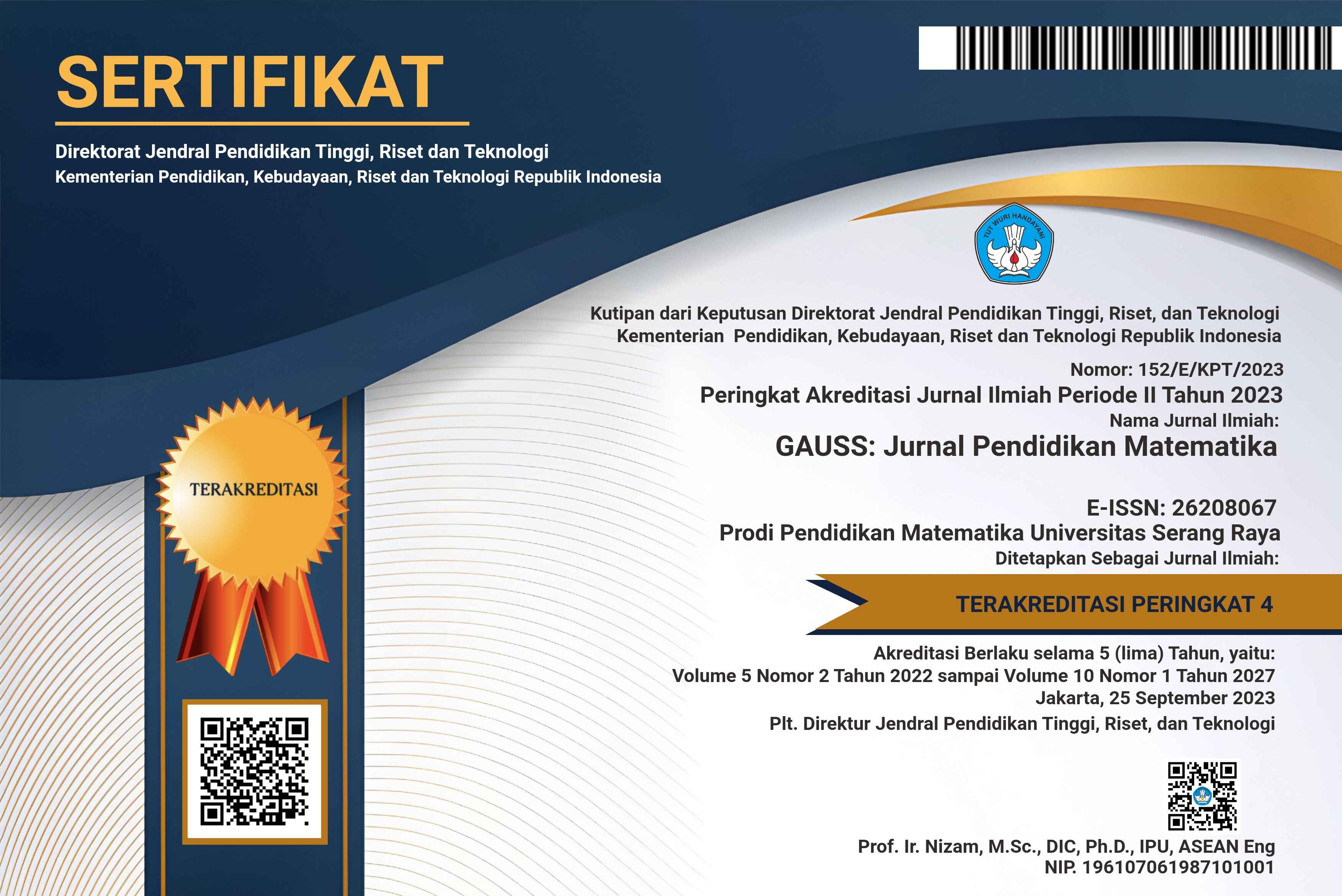Pengaruh Model Pembelajaran dan Minat Siswa Terhadap Hasil Belajar Matematika
DOI:
https://doi.org/10.30656/gauss.v1i1.639Keywords:
Model of Learning, Learning Outcomes, Learning InterestAbstract
Influence Model of learning and Learning Interest Against the results of the Learning of Mathematics (Model of learning, the learning interest of mathematics learning outcomes, ANOVA two lanes and experimentation. The goal of penelitihan is to know the influence of learning against the results of learning math student SMK negeri in Pandeglang, the influence of the interest in the results of learning math student SMK negeri in Pandeglang, influence the learning interaction student learning and interest against the results of learning math student SMK negeri in Pandeglang. The results of penelitihan showed there are influences of yan siqnifikan learning against the results of learning math students of SMK negeri in Pandeglang model learning and learning interest of students towards learning outcomes for Mathematics (high and low)References
Hurlock, E.B. (1999). Psikologi Perkembangan: Suatu Pendekatan Sepanjang Rentang Kehidupan. Jakarta: Erlangga.
Oktaviyanthi, R. (2014). Analysis of Mathematics Teaching based on the Students Characteristics. (Online), (http://eprints.uny.ac.id/11579/, diakses 10 September 2017).
Oktaviyanthi, R. dan Herman, T. (2016, Oktober). A Delivery Mode Study: The Effect of Self-Paced Video Learning on First-Year College Students’ Achievement in Calculus. Artikel dipresentasikan pada The 4th International Conference on Quantitative Sciences and Its Applications, Universiti Utara Malaysia, Putrajaya, Malaysia. (Online) (http://aip.scitation.org/doi/abs/10.1063/1.4966102, diakses 10 September 2017).
Oktaviyanthi, R dan Supriani, Y. (2017, Oktober 21). A Description of the Student’s Problem Solving Ability Based on Personality Tendency. (Online), (https://osf.io/f5qpz, diakses 10 September 2017).
Oktaviyanthi, R. (2015). Kajian Model Pembelajaran: Pendekatan Cognitive Apprenticeship Model Case Based Reasoning Dalam Pembelajaran Matematika. Artikel dipresentasikan pada Seminar Nasional Matematika 2015, Universitas Katolik Parahyangan, Bandung. (Online), (http://doi.org/10.17605/OSF.IO/H7ER2, diakses 10 September 2017).
Suyitno, A. (2004). Dasar-Dasar Dan Proses Pembelajaran Matematika I. Tidak diterbitkan.
Suherman, E. (2002). Strategi Pembelajaran Matematika Komtemporer (Common Textbook). Bandung: FMIPA UPI.
Sudjana, N. (2001). Penilaian Hasil Proses Belajar Mengajar. Bandung: Remaja Rosdakarya.
Suherman, E. dan Winataputra. (2001). Strategi Belajar Mengajar Matematika. Jakarta: Depdikbud.
Subaryana. (2007) Referensi: Pengembangan Bahan Ajar. Yogyakarta: IKIP PGRI Wates.
Slameto. (1995). Belajar Dan Faktor-Faktor Yang Mempengaruhi. Jakarta: Rineka Cipta.
Winkel, W.S. (1983). Psikologi Pendidikan dan Evaluasi Belajar. Jakarta: Gramedia.
Downloads
Published
Issue
Section
License
Authors who publish articles in GAUSS : JURNAL PENDIDIKAN MATEMATIKA agree to the following terms:
- Authors retain copyright and grant the journal the right of first publication with the work simultaneously licensed under a Creative Commons Attribution-ShareAlike 4.0 International License that allows others to share the work with an acknowledgment of the work's authorship and initial publication in this journal.
- Authors are able to enter into separate, additional contractual arrangements for the non-exclusive distribution of the journal's published version of the work (e.g., post it to an institutional repository or publish it in a book), with an acknowledgment of its initial publication in this journal.
- Authors are permitted and encouraged to post their work online (e.g., in institutional repositories or on their website) before and during the submission process, as it can lead to productive exchanges, as well as earlier and greater citation of published work (See The Effect of Open Access).




